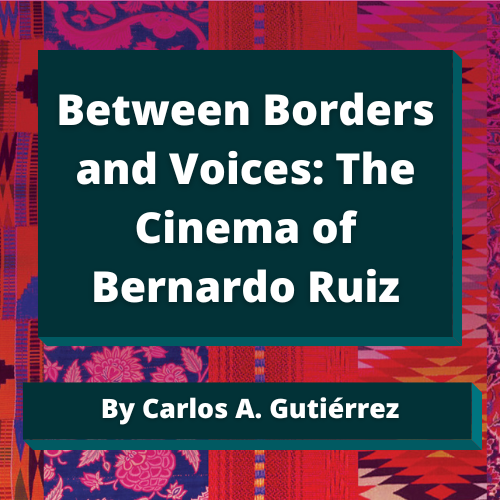Between Borders and Voices: The Cinema of Bernardo Ruiz
By Carlos A. Gutiérrez
In November 2025, audiences in New York City will encounter the first-ever mid-career retrospective dedicated to Bernardo Ruiz, a pathbreaking three-time Emmy-nominated filmmaker whose documentaries have carved a space for complex and humane portrayals of the Latin American experience at home and in the U.S.
Presented by Color Congress through its Elev8Docs marketing initiative and co-presented by Cinema Tropical, this citywide 5-film retrospective — opening at the Museum of the Moving Image on Saturday, November 1 — comes at a moment when nonfiction cinema is an indispensable tool for reckoning with fractured public discourse, contested histories, and ongoing struggles for justice.
For almost two decades, Ruiz has pursued a clear, unflinching mission: to craft rigorous, socially engaged documentaries that amplify voices too often pushed to the margins. His films illuminate the lives of journalists, farmworkers, migrants, Indigenous runners, and human rights advocates — figures who rarely occupy the center of media narratives, yet whose stories reveal urgent truths about power, violence, and resilience. Across this body of work, Ruiz has developed a style that is at once investigative and lyrical, committed to accountability while attuned to the subtleties of daily life.
Born in Guanajuato, Mexico, to a Mexican father and an American mother, Ruiz moved to the United States at the age of six and grew up in Brooklyn. His dual heritage shaped a sensibility alert to both the fractures and the bridges between cultures. He came of age in a city defined by migration and contradiction, where stories of displacement and survival coexisted with structures of exclusion. This vantage point — simultaneously inside and outside — became a cornerstone of his filmmaking practice.
Unlike many contemporaries who gravitated toward commercial outlets or the prestige of the festival circuit, Ruiz aligned himself with the often-precarious world of public television. Working against all odds, he embraced a space historically devoted to civic education and community dialogue. For Ruiz, public media represented more than a distribution platform: it was a political choice, a commitment to accessibility and plurality at a time when mainstream media increasingly abandoned nuanced reporting on Latin America and its diasporas.
Bernardo Ruiz during the production of HARVEST SEASON. Credit: Roberto ‘Bear’ Guerra.
At the heart of Ruiz’s work lies a conviction that documentary is not just about relaying facts, but about resisting erasure. His films consistently expose how certain communities — immigrants, workers, Indigenous peoples, dissidents — are demonized or rendered invisible. Yet they go beyond denunciation. Ruiz insists on showing how people resist, endure, and imagine new futures, even under oppressive conditions. His protagonists are never reduced to victims; they are agents, thinkers, and creators of meaning.
This ethical stance is accompanied by a cinematic sensitivity. Ruiz’s films are marked by careful composition, attentive soundscapes, and an eye for quotidian detail: the rhythms of harvest, the quiet determination of a runner, the gestures of solidarity among journalists under siege. His documentaries engage both the mind and the heart, grounding structural critique in lived experience.
The retrospective assembles five major feature films that together chart Ruiz’s evolving vision.
Reportero (2012), his breakthrough, follows Mexican journalists who continue to publish stories in the face of relentless violence. More than an exposé, the film becomes a meditation on courage and the meaning of truth-telling when words themselves carry mortal risk.
Kingdom of Shadows (2015) extends this inquiry into the broader human toll of the drug war, weaving together the testimonies of a nun, a former trafficker, and a U.S. federal agent. By juxtaposing these disparate voices, Ruiz resists simplistic binaries and emphasizes the systemic entanglements that perpetuate violence.
With Harvest Season (2018), Ruiz turns to California’s wine country to foreground the Latinx farmworkers who sustain a multi-billion-dollar industry. Eschewing sensationalism, the film dwells on labor’s dignity, seasonal rhythms, and the bonds forged in shared toil. It is as much a portrait of community as it is an agricultural chronicle.
The Infinite Race (2020), part of ESPN’s celebrated “30 for 30” series, focuses on the Tarahumara (Rarámuri) runners of northern Mexico, renowned for their endurance. Yet Ruiz avoids exoticizing them. Instead, he situates running within broader histories of displacement, colonization, and resilience, underscoring the community’s agency in preserving its traditions amid external pressures.
El Equipo (2023) tells the remarkable story of an American forensic doctor and a group of Argentine students whose groundbreaking work in the 1980s transformed the pursuit of human rights. Through their pioneering forensic anthropology, they unearthed the crimes of state terror and gave voice to the disappeared. The film exemplifies Ruiz’s commitment to uncovering histories that resonate across borders, demonstrating how acts of memory and science can confront entrenched impunity.
Taken together, these works testify to Ruiz’s breadth — ranging from border politics to agrarian labor, from sports culture to transitional justice — yet unified by a consistent ethic of care and inquiry.
At mid-career, Ruiz has already shaped the contours of Latinx documentary practice in the U.S., influencing younger filmmakers and expanding the reach of public media. Along with Natalia Almada, Alex Rivera, and Cristina Ibarra, he belongs to a generation of Latinx filmmakers who paved the way for others in American independent film to find their voice. Ruiz’s Emmy nominations recognize professional excellence, but they only hint at the cultural significance of his work.
In a moment when misinformation circulates with unprecedented speed, when xenophobia resurges in public discourse, and when media conglomerates consolidate narratives for profit, Ruiz’s cinema stands as a countervailing force. His documentaries restore complexity to communities caricatured as threats or statistics. They remind audiences that journalism, labor, ritual, and science are not abstractions but lived practices tied to human dignity.
A retrospective is not merely a celebration of past achievements; it is a political act. By circulating and celebrating Ruiz’s films, the program challenges the cultural amnesia that so often shrouds Latinx histories in the U.S. It affirms the necessity of nonfiction storytelling that bridges North and South, English and Spanish, the personal and the geopolitical. And it signals to institutions — from broadcasters to funders — that this work matters and must continue.
Ruiz belongs to a generation that entered the field when public television still served as a reliable platform for independent voices. Today, that space is under siege — attacked by the federal government and squeezed by streaming platforms that prioritize global franchises over local accountability. Ruiz’s career thus embodies both the possibilities and the precarity of nonfiction filmmaking: the potential to reach wide audiences with socially urgent work, alongside the challenge of sustaining that work within fragile infrastructures.
In highlighting his films, the retrospective implicitly advocates for a broader ecosystem of support — one that values investigative rigor, artistic vision, and civic commitment. Ruiz’s example demonstrates that documentaries can be both elegant and consequential, both intimate and systemic.
Ruiz’s films are acts of witness, but also acts of imagination: they envision futures in which marginalized communities are not simply observed but heard, understood, and honored. The retrospective is therefore more than a look back. It is an invitation to engage with the present — to confront the forces that silence and to stand with those who speak. At mid-career, Ruiz’s achievements affirm the enduring power of documentary to unsettle, to illuminate, and to inspire.
Other screenings in the Retrospective are slated for the following dates and locations: Firehouse Cinema at DCTV on Wednesday, November 5; Maysles Cinema on Friday, November 21; Lehman College during the week of November 17; and CUNY Graduate Center, TBD.
Carlos A. Gutiérrez is co-founding executive director of Cinema Tropical, the New York-based media arts non-profit organization founded in 2001, which is the leading promoter of Latin American cinema in the U.S. As a guest curator, he has presented several series at numerous institutions such as MoMA, Film at Lincoln Center, the Guggenheim Museum, BAM Film, and Anthology Film Archives. He co-curated the Robert Flaherty Film Seminar in 2007 and 2025, currently serves as artistic director of the Museum of Fine Arts, Houston’s Latin Wave film festival and as co-director of Cinema Tucsón. He is a member of the Academy of Motion Picture Arts and Sciences (AMPAS), sits in Film Forum’s Board of Directors, and is founding member of the collective Distribution Advocates. He has served as a juror, nominator, and panelist for various international film festivals and funds including IDFA, Tribeca, Mar del Plata, DOC NYC, Doclisboa, New Orleans, Morelia, Seattle, Margaret Mead, SANFIC, the Sundance Documentary Fund and the Rolex Mentor and Protégé Arts Initiative.


